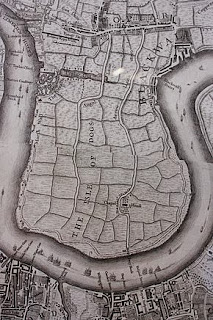Jonson, Ben, and Thomas Nashe. The Isle of Dogs. N.p.: N.p., 1597.
In the summer of 1597, Ben Johnson, Thomas Nashe, and a number of players got in very hot water indeed. They had just performed The Isle of Dogs, and such was the furor over it that the Swan Theatre, where it was preformed, was closed—permanently.
No one is quite sure what specifically gave so much offense, but it is clear that it deeply offended the government in general and Queen Elizabeth I in particular—indeed, it may have made fun of the King of Poland (and / or his ambassador) and Queen Elizabeth herself. The Lost Play Database has complied a number of important documents relevant to the case, and they give the feeling that people are even afraid to talk about the play, much less provide specifics about the outrage it spawned.
As my grandmother used to say, I told you that to tell you this.
In the winter of 2014, a film called The Interview was cancelled by Sony Pictures. About that film, we know a great deal. Its plot involves coercing talk show hosts who have landed an interview with North Korean leader Kim Jong-un into attempting to assassinate him in some way during the interview.
What's fascinating is that the film would probably not have caused such a ruckus if its subject had been a non-contemporary world leader. What if the show were set in the 1940s and the interviewers were asked to assassinate Hitler? How about setting the play in the future and having a more generalized world leader as its subject? What about making the conspirators Elizabethan Catholic plotters interviewing Queen Elizabeth I as a pretext for an assassination attempt on her?
The contemporaneity of the two works caused the trouble. Shakespeare occasionally got himself into warm if not hot water (cf. the "I am Richard—know ye not that" episode), yet he largely avoided it by what we Shakespeare scholars like to call "The Thin Veil." By thinly veiling contemporary issues, Shakespeare was able to address them without causing such turmoil. After all, Shakespeare himself wrote a play about the assassination of a world leader whose succession was in question, yet 1599 (the year in which it was written and first performed) did not see the closing of the Globe Theatre; instead, it was one of Shakespeare's most successful years.
Links: The Play at The Lost Plays Database.


No comments:
Post a Comment